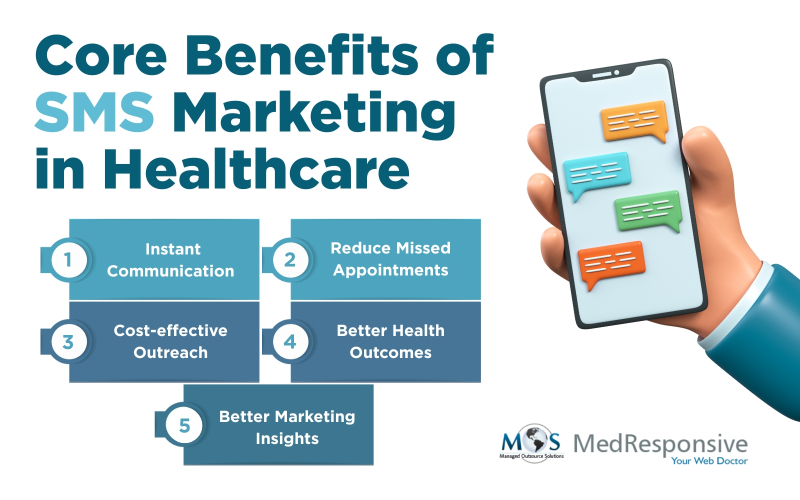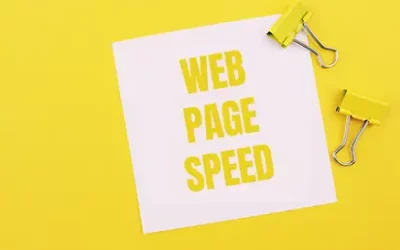Active patient engagement often takes a backseat due to the focus on clinical priorities such as treatment, protocols, and outcomes. However, patients who participate in their care are more likely to follow treatment plans, attend follow-up appointments, and notice better health results. This is where SMS marketing in healthcare plays a vital role by bridging the communication gap between providers and patients. From confirming appointments to promoting health campaigns, SMS makes patient engagement simple and accessible. This consistent touch point builds trust, fosters long-term relationships, and boosts return on investment by optimizing patient retention. However, as healthcare providers need to prioritize patient care over marketing efforts, practices can partner with experienced healthcare digital marketing services to implement proven digital patient outreach strategies that drive measurable results.
Key Benefits of Optimizing Healthcare Marketing with Mobile Messaging
Healthcare providers can integrate SMS marketing into their digital advertising strategies to realize the given benefits:
- Instant Communication
One of the key advantages of SMS is its ability to facilitate instant communication between patients and their providers. Unlike email or chat messages, which require an active internet connection, SMS relies on cellular networks, ensuring direct delivery to mobile phones. This aspect of SMS makes it particularly effective for reaching elderly patients or individuals in remote areas where internet access may be limited. Practices can also enhance personalization in text messaging with a patient’s name, location, and treatment details for improved satisfaction, engagement, and retention rates.
- Reduce Missed Appointments
With an outstanding open rate of 98%, cellular messages function as a reliable channel for appointment management. By sending timely appointment reminders directly to a patient’s phone, providers can confirm, reschedule, or cancel upcoming patient visits. This is especially valuable in minimizing appointment conflicts for busy practices and patients with packed schedules. Beyond that, SMS can also be automated to reduce the workload associated with repetitive phone calls, allowing staff to focus on other critical tasks.
- Cost-effective Outreach
In smaller practices with limited budgets, SMS provides a highly cost-effective option for medical digital marketing. Compared with costly billboards or paid ads, text messages incur minimal distribution costs while enabling precise targeting and immediate visibility. This allows healthcare providers to quickly achieve campaign goals. SMS can be used to communicate a variety of activities such as health campaigns, seasonal offerings, payment reminders, and prescription refills, all with measurable results. With its low cost per engagement and per patient conversion, SMS delivers high-impact interactions efficiently, providing more value per dollar than most other marketing methods.
- Better Health Outcomes
Healthcare providers can share patient health details such as diagnostic reports, test results, and post-visit wellness tips via secure SMS links, improving health information accessibility. Two-way messaging in healthcare allows patients to ask questions, clarify instructions, or schedule follow-ups in real time, which can significantly improve adherence to treatment plans.
Mobile messaging can also support broader public health initiatives. Providers can share information about vaccinations, screenings, or routine check-ups, send short, digestible messages about seasonal health campaigns, and deliver health tips for lifestyle changes. In urgent situations, SMS can quickly communicate emergency alerts or clinic updates.
- Better Marketing Insights
Text campaigns generate valuable data on patient engagement, such as open rates, click-through, and response patterns. By analyzing text message data, healthcare providers can refine their messaging strategies, optimize appointment scheduling, and improve overall patient outreach. Insights from text interactions can also guide future campaigns and help measure the effectiveness of telehealth communication efforts.
Best Practices for Healthcare SMS Campaigns
Healthcare providers can maximize the impact of mobile text marketing by adopting tailored strategies that balance efficiency with patient care. Implementing these best practices ensures that messages are not only seen but also valued, fostering enhanced relationships with patients.
Here’s how providers can optimize their SMS efforts:
- Obtain Patient Consent
Practices must always secure explicit patient consent before sending any text messages and make it easy to opt out at any time. Educate your patients about the benefits of participating in SMS campaigns — timely reminders, tailored health tips, and better access to care. This approach builds trust, ensures privacy, and aligns with regulations such as HIPAA, making patients more likely to engage with the content.
- Personalize Messages
Segment your patient base into groups based on factors such as demographic, medical conditions, and clinical history. Segmentation helps to customize text messages by including specific details like name, appointment type, and medication instructions. Personalized texts feel less transactional and more thoughtful, leading to higher patient satisfaction and stronger connection with providers.
- Keep the Content Short and Clear
Text messaging is inherently a short-form communication medium, which makes conciseness crucial for impactful results. Messages should be direct, easy to read, and actionable to help reduce no-show rates for your clinic. Avoid medical jargon or unnecessary details in texts that could confuse your patients. For example, instead of sending long paragraphs about clinic updates, break information into short, digestible pieces of information with clear calls to action, such as “Reply YES to confirm your appointment on August 30th at 10 AM.”
- Timing and Frequency
The timing of messages can significantly influence patient response rates. Avoid sending texts too early in the morning or late at night to prevent message fatigue and overwhelm your patients. Strategically time your messages at specific frequency, typically during business hours or early evenings. For reminders about appointments, medications, or lab results, consider sending messages a day or two in advance. Proper timing ensures messages are helpful rather than intrusive, further strengthening the patient-provider relationship.
- Secure Sensitive Information
Healthcare information is incredibly personal, and providers must remain vigilant about privacy and security when using SMS marketing. Messages should be compliant with relevant regulations such as HIPAA, and practices can establish strict internal policies for HIPAA-compliant messaging. Using a secure messaging platform with robust encryption and access control ensures that user data remains confidential. Conduct security audits, vulnerability assessments to identify potential risks, safeguard against data breaches, and avoid legal complications.
- Monitor and Optimize Campaigns
Continuous improvement is key to successful SMS marketing. Analyze campaign performance by tracking metrics such as delivery rates, open rates, click-through rates, and patient responses. Use these insights to refine message content, frequency, and targeting strategies. A/B testing can help determine which types of messages resonate most with patients, enabling providers to continually enhance engagement and campaign performance. Over time, data-driven optimization ensures that SMS campaigns deliver maximum value for both patients and practices.
Leverage Outsourcing for Successful SMS Campaigns
SMS marketing serves as a practical, cost-effective, and measurable method for connecting healthcare providers and patients in a meaningful way. Despite the rise of advanced mobile health (mHealth) solutions, the simplicity, accessibility, and immediacy of SMS make it the cornerstone of patient engagement strategies. Practices that partner with healthcare marketing services can employ this tool to not only improve individual patient outcomes but also optimize clinical efficiency, strengthen their reputation, and achieve long-term growth. Outsourcing allows healthcare providers to focus on patient care while leaving the complexities of messaging strategy, compliance, and analytics to experts.





